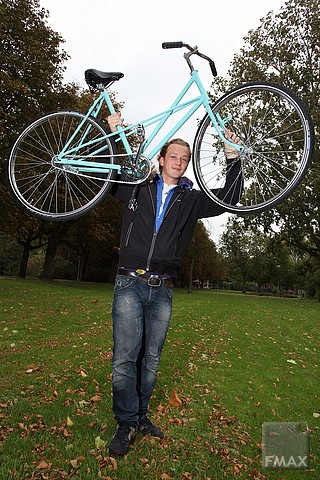International students thrill at buying their first Dutch bikes, while for the Dutch, bikes are from cradle to grave. Two enterprising young Dutch students are now striving to take bike production to a whole new level of innovation and sustainable production.
Lodewijk Bosman, an MSc student in industrial ecology and integrated product design, and Hidde van der Straaten, an international business student at Hogeschool Amsterdam, are into the final rounds of two competitions to win start-up money for their company, called The Upcycle, which will refurbish old bikes into new ones. They plan on using socially responsible production methods, and by reusing old parts, to significantly reduce each bike’s environmental impact.
The Dutch authorities regularly remove old bikes from places like train stations, and if these bikes go unclaimed, they’re usually destroyed. In Amsterdam, 30,000 bikes are destroyed each year alone. Bosman and Van der Straaten aim to tap into this stream of useful trash and ‘upcycle’ the parts into new bicycles. Upcycling is to take waste materials or seemingly useless products and transform them into new materials or products of higher quality or environmental value, which positively impacts the environment by creating production methods that eliminate the need for energy and materials to process waste and extract raw materials.
The concept began in an industrial ecology course on urban infrastructure, where students were challenged to think about ways of reusing waste streams in cities. “In my head it linked to those huge storage areas of abandoned bikes, just standing there doing nothing,” Bosman recounts. “After some research, I discovered that most of these bikes are shredded and recycled for scrap. And then I thought: ‘can’t we do something better than this?’ Right now most bikes come from places like China, and the attention given to the environment is minimal. In Holland there are more bikes than people, so there’s something wrong with that.”
Bosman teamed up with his friend Van der Straaten and wrote a business plan in the Sustainable Business Game course, during which the pair also conducted market research, studied environmental impacts and further refined their product and branding concept. In this course, the idea is to have an entire family of products emerge, so not only will The Upcycle make bicycles but also other goods like furniture, jewelry and lighting from old bicycle parts.
The Upcycle project focuses on the bike parts that can most easily be reused, like the frame, fork and handlebars. Additionally, mud guards made from old tires, and secondhand lights, will be developed. Other parts, like the tires, will be from new material, as the goal is to arrive at a final product that is the quality equivalent of new bicycles. Meanwhile, other old bike parts will be transformed into furniture or jewelry. And at the end of an Upcycle product’s lifespan, it can be resold to The Upcycle company for reuse, further reducing the overall environmental impact.
Triple P
Reusing old bicycle parts lowers a variety of environmental impacts, particularly that of metal production and ore extraction. Metal, the primary material in any bicycle, is the largest source of environmental impact; consequently, by reusing unused bicycles’ aluminum parts, the carbon footprint of manufacture is reduced by between 61 and 147 kilograms – or more than a train trip from Amsterdam to Rome. For parts that must be purchased new, Bosman and van der Straaten will assess the life-cycle impacts of each part and then chose products with the lowest impacts, like eco-paint, leather, cork, wood and materials that travel shorter distances.
The Upcycle project however is about more than just about reducing environmental impact, as Bosman and Van der Straaten take a ‘triple P’ approach towards their business concept: ‘The Planet’ benefits from reusing old bicycles; ‘The People’ benefit from their partnering with the social workplace Stunt Delft, providing creative, satisfying work for people who are otherwise unemployable; and ‘The Profit’ benefits come from trading bicycle parts – anyone can buy/sell old bicycle parts through the company – and the added value of reusing old parts. The result: a unique, new bicycle brand that has green credentials and is socially responsible.
“A million bicycles are sold in the Netherlands each year, and there are currently 1.1 bicycles for every person in the country,” Bosman says. This implies that there’s lots of potential for a unique product like the Upcycle. To get started, Bosman and Van der Straaten are competing for start-up capital from two different organizations. The project is one of two finalists in ‘Zuid-Holland Award’ student category, with the winner receiving €10,000 for starting a business, and the Upcycle project is also in the final round (one of the Top 40 projects) of the ‘For Tomorrow’s World’ contest, which awards €10,000 to the top five entrants. The ‘Tomorrow’s World’ contest allows the public to select its favorite project by voting on the organization’s website.
De oorkonde is een initiatief van de Federatie Bewonerscomités Nieuw Crooswijk (FBNC) en een waardering voor Thomsens inzet ‘bij het behoud van Nieuw Crooswijk’.
Volgens het Masterplan Nieuw Crooswijk moeten in de wijk 1800 ‘nog goede’ huurwoningen worden gesloopt. Voor 800 is het al te laat. Thomsen helpt met andere deskundigen de wijkbewoners om de resterende woningen te redden. Thomsen is sinds 1983 hoogleraar Woningverbetering en Woningbeheer.



Comments are closed.